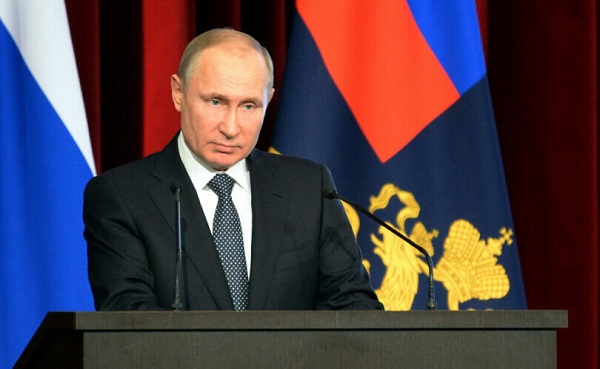Uncategorized
UK’s May seeks compromise with Labour in EU divorce deal
LONDON — British Prime Minister Theresa May sought a compromise Monday with opposition leader Jeremy Corbyn in hopes of securing his backing for a divorce deal with the European Union.
The political
Taking a cordial tone, May suggested further talks with the Labour Party leadership even as she said she did not see the advantage of permanent membership in the EU’s customs union, a key demand Corbyn is seeking in exchange for backing her troubled Brexit bill in Parliament.
Justice Minister Rory Stewart told the BBC that differences between the two parties aren’t as great as some suggest, but said the Conservative government can’t accept Corbyn’s customs union demand because it would prevent Britain from negotiating trade deals with other countries. He said May’s agreement would achieve most of Corbyn’s goals without preventing independent trade deals.
“I agree that the longer this goes on, the more risky it gets, obviously,” Stewart said. “But, the solution to this has to be to get Jeremy Corbyn, or the Labour Party, or indeed Parliament as a whole, to come behind a deal.”
Time pressure is mounting. Britain is due to leave the EU on March 29, but lawmakers in Parliament have emphatically rejected May’s divorce deal, raising the prospect of a no-deal exit from the bloc unless more parliamentary support is found.
EU leaders have turned down May’s plea to renegotiate parts of the legally binding Brexit withdrawal bill, making the no-deal outcome more likely even though both sides believe it would harm their economies.
May is to give a statement to Parliament on Tuesday, a day earlier than planned. Downing Street said that would give Parliament a few days to consider her remarks.
Lawmakers may be unnerved by the latest round of financial data, which showed Monday that Britain’s economy slowed last year to its weakest growth rate since the global financial crisis.
The Office for National Statistics said the British economy grew by a quarterly rate of only 0.2
In the fourth quarter, British business investment fell 1.4
With less than 50 days to go to Brexit day on March 29, British firms still have no idea what the country’s new trading relationship with the EU will look like, so they’re taking a safety-first approach.
Although Britain’s Treasury chief Philip Hammond argued the British economy remains “fundamentally strong” and is “enjoying the longest unbroken quarterly growth streak” among the Group of Seven industrialized countries, he conceded that Brexit unease was taking its toll.
“There is no doubt that our economy is being overshadowed by the uncertainty created by the Brexit process,” he told Sky News. “I’m afraid this has gone on longer than we would have liked.”
___
Pan Pylas contributed from London.
___
Follow AP’s full coverage of Brexit at: https://www.apnews.com/Brexit
The Associated Press
Uncategorized
Cost of bureaucracy balloons 80 per cent in 10 years: Public Accounts

The cost of the bureaucracy increased by $6 billion last year, according to newly released numbers in Public Accounts disclosures. The Canadian Taxpayers Federation is calling on Prime Minister Mark Carney to immediately shrink the bureaucracy.
“The Public Accounts show the cost of the federal bureaucracy is out of control,” said Franco Terrazzano, CTF Federal Director. “Tinkering around the edges won’t cut it, Carney needs to take urgent action to shrink the bloated federal bureaucracy.”
The federal bureaucracy cost taxpayers $71.4 billion in 2024-25, according to the Public Accounts. The cost of the federal bureaucracy increased by $6 billion, or more than nine per cent, over the last year.
The federal bureaucracy cost taxpayers $39.6 billion in 2015-16, according to the Public Accounts. That means the cost of the federal bureaucracy increased 80 per cent over the last 10 years. The government added 99,000 extra bureaucrats between 2015-16 and 2024-25.
Half of Canadians say federal services have gotten worse since 2016, despite the massive increase in the federal bureaucracy, according to a Leger poll.
Not only has the size of the bureaucracy increased, the cost of consultants, contractors and outsourcing has increased as well. The government spent $23.1 billion on “professional and special services” last year, according to the Public Accounts. That’s an 11 per cent increase over the previous year. The government’s spending on professional and special services more than doubled since 2015-16.
“Taxpayers should not be paying way more for in-house government bureaucrats and way more for outside help,” Terrazzano said. “Mere promises to find minor savings in the federal bureaucracy won’t fix Canada’s finances.
“Taxpayers need Carney to take urgent action and significantly cut the number of bureaucrats now.”
Table: Cost of bureaucracy and professional and special services, Public Accounts
| Year | Bureaucracy | Professional and special services |
|
$71,369,677,000 |
$23,145,218,000 |
|
|
$65,326,643,000 |
$20,771,477,000 |
|
|
$56,467,851,000 |
$18,591,373,000 |
|
|
$60,676,243,000 |
$17,511,078,000 |
|
|
$52,984,272,000 |
$14,720,455,000 |
|
|
$46,349,166,000 |
$13,334,341,000 |
|
|
$46,131,628,000 |
$12,940,395,000 |
|
|
$45,262,821,000 |
$12,950,619,000 |
|
|
$38,909,594,000 |
$11,910,257,000 |
|
|
$39,616,656,000 |
$11,082,974,000 |
Uncategorized
Trump Admin Establishing Council To Make Buildings Beautiful Again


From the Daily Caller News Foundation
By Jason Hopkins
The Trump administration is creating a first-of-its-kind task force aimed at ushering in a new “Golden Age” of beautiful infrastructure across the U.S.
The Department of Transportation (DOT) will announce the establishment of the Beautifying Transportation Infrastructure Council (BTIC) on Thursday, the Daily Caller News Foundation exclusively learned. The BTIC seeks to advise Transportation Secretary Sean Duffy on design and policy ideas for key infrastructure projects, including highways, bridges and transit hubs.
“What happened to our country’s proud tradition of building great, big, beautiful things?” Duffy said in a statement shared with the DCNF. “It’s time the design for America’s latest infrastructure projects reflects our nation’s strength, pride, and promise.”
“We’re engaging the best and brightest minds in architectural design and engineering to make beautiful structures that move you and bring about a new Golden Age of Transportation,” Duffy continued.
Mini scoop – here is the DOT’s rollout of its Beautifying Transportation Infrastructure Council, which will be tasked with making our buildings beautiful again. pic.twitter.com/
9iV2xSxdJM — Jason Hopkins (@jasonhopkinsdc) October 23, 2025
The DOT is encouraging nominations of the country’s best architects, urban planners, artists and others to serve on the council, according to the department. While ensuring that efficiency and safety remain a top priority, the BTIC will provide guidance on projects that “enhance” public areas and develop aesthetic performance metrics.
The new council aligns with an executive order signed by President Donald Trump in August 2025 regarding infrastructure. The “Making Federal Architecture Beautiful Again” order calls for federal public buildings in the country to “respect regional architectural heritage” and aims to prevent federal construction projects from using modernist and brutalist architecture styles, instead returning to a classical style.
“The Founders, in line with great societies before them, attached great importance to Federal civic architecture,” Trump’s order stated. “They wanted America’s public buildings to inspire the American people and encourage civic virtue.”
“President George Washington and Secretary of State Thomas Jefferson consciously modeled the most important buildings in Washington, D.C., on the classical architecture of ancient Athens and Rome,” the order continued. “Because of their proven ability to meet these requirements, classical and traditional architecture are preferred modes of architectural design.”
The DOT invested millions in major infrastructure projects since Trump’s return to the White House. Duffy announced in August a $43 million transformation initiative of the New York Penn Station in New York City and in September unveiledmajor progress in the rehabilitation and modernization of Washington Union Station in Washington, D.C.
The BTIC will comprise up to 11 members who will serve two-year terms, with the chance to be reappointed, according to the DOT. The task force will meet biannually. The deadline for nominations will end Nov. 21.
-

 Alberta20 hours ago
Alberta20 hours agoThe Recall Trap: 21 Alberta MLA’s face recall petitions
-

 Fly Straight - John Ivison2 days ago
Fly Straight - John Ivison2 days agoMPs who cross the floor are dishonourable members
-

 illegal immigration20 hours ago
illegal immigration20 hours agoUS Notes 2.5 million illegals out and counting
-

 International20 hours ago
International20 hours agoTyler Robinson shows no remorse in first court appearance for Kirk assassination
-

 2025 Federal Election2 days ago
2025 Federal Election2 days agoToo Close for Comfort: Carney Floor Crosser Comes From a Riding Tainted by PRC Interference
-

 Energy1 day ago
Energy1 day agoCanada’s future prosperity runs through the northwest coast
-

 illegal immigration2 days ago
illegal immigration2 days agoEXCLUSIVE: Canadian groups, First Nation police support stronger border security
-

 Business2 days ago
Business2 days agoBrutal economic numbers need more course corrections from Ottawa










